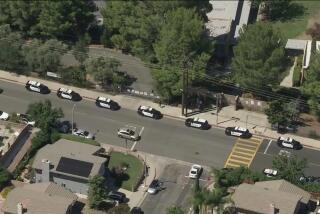Today’s Agenda
- Share via
Horror so often creeps up on us by inches. So it is with the fatal shooting of 17-year-old Michael Shean Ensley last Monday at Reseda High School, hard on the heels of the death of Demetrius Rice on the campus of Fairfax High School.
First, the reports of students carrying knives to school. Then younger and younger people involved in drive-by shootings in the neighborhoods. Then the first reports of guns in student backpacks--reports often discounted by adults as exaggerated. Then a cheerleader is killed just off campus. Another student dies by gunfire in a fast-food joint across from campus. Finally, the sanctum is breached and it’s no fluke. It’s repeated. We recoil and wonder where it went wrong.
In Youth Opinion, we hear from high-school students who are trying to calm themselves, think of ways to keep safe, explain what makes kids carry guns to school. They long for what they see as the safer 1980s. Their grief and a growing doubt that adults can protect them are palpable.
Not all school stories, however, are about violence or fear. Making a Difference tells about a college program that successfully reaches young women who might otherwise, as one student put it, think of fast food as a career. Mount St. Mary’s College Alternative Access Program provides a nurturing, closely monitored learning environment that builds the confidence to succeed in a student body that is all-female, largely minority and mostly poor.
When Julie and Mark Dunn first wrote about the drug users who had taken over the alley behind their Pico-Union district home (“Crack Alley,” Voices, Jan. 14), they despaired of getting any effective help from the police, from social agencies, from the city of Los Angeles in general. In a Community Update, the Dunns tell us that, against the odds, things are improving. But it took a lot of persistence on residents’ part--they have tracked arrests through the judicial system, stayed in close touch with police, grown savvy about which bureaucracy is responsible for what part of a cleanup.
Fixing what’s broken in urban life is also a theme in Testimony. Rabbi Laura Geller, director of the regional office of the American Jewish Congress, talks about the stake of Jews in the health of Los Angeles. Survival as a minority demands involvement, she says, as do the commandments of religion.
Teachers get no respect, says teacher Ula Pendleton in Modest Proposal. Salaries and status are skewed toward administration, so everybody wants out of the classroom. If children are our No. 1 priority, as everyone says, then the power and status ought to be reversed, and the most ambitious people should be clamoring for classroom assignments. We could start by reversing school districts’ salary structures, she suggests.
And finally, what congests the streets, contributes to pollution and is absolutely useless? According to Linda Morley in Gripe, it’s those new trucks that endlessly roam the streets with advertising billboards on both sides--an insult on so many levels.
More to Read
Sign up for Essential California
The most important California stories and recommendations in your inbox every morning.
You may occasionally receive promotional content from the Los Angeles Times.













